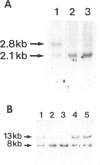Abstract
An accurate diagnosis of heterozygotes for autosomal recessive disorders with unknown mutations can be difficult. Using a unique phenomenon occurring in vivo, we designed a method for the diagnosis of heterozygotes for adenine phosphoribosyltransferase (APRT) deficiency which makes way for a qualitative distinction between normal and heterozygous subjects. We cultured peripheral blood mononuclear cells with 2,6-diaminopurine, an APRT-dependent cytotoxin, to search for in vivo mutational cells. Fifteen putative heterozygotes examined were found to possess such mutant cells at rather high frequencies; thus, a false negative diagnosis is unlikely. The analysis of genomic DNA in 82 resistant clones from two of the heterozygotes clarified that 64 (78%) had lost the germinally intact alleles. Thirteen members of APRT-deficient families were examined; eight proved to be heterozygotes. Among 425 individuals from two separate residential areas of Japan, two heterozygotes were found. The authenticity of the heterozygosity was validated by two separate methods for the two heterozygotes; hence, a false positive diagnosis can be ruled out. Our data showed a calculated heterozygote frequency of 0.47% (95% confidence limits; 0.05%-1.7%), a value compatible with that (1.2%) calculated from data concerning the incidence of 2,8-dihydroxyadenine urolithiasis. This novel genetic approach for identifying heterozygotes is now being tested to search for other enzyme deficiencies in humans.
Full text
PDF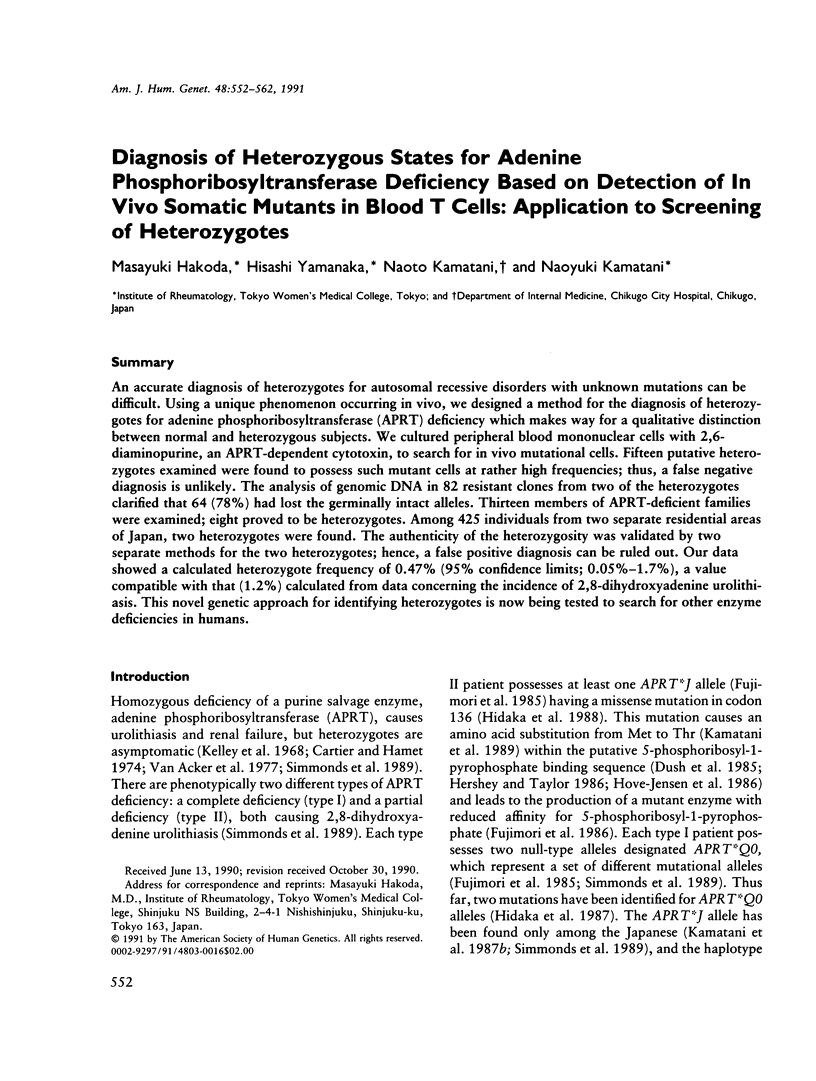
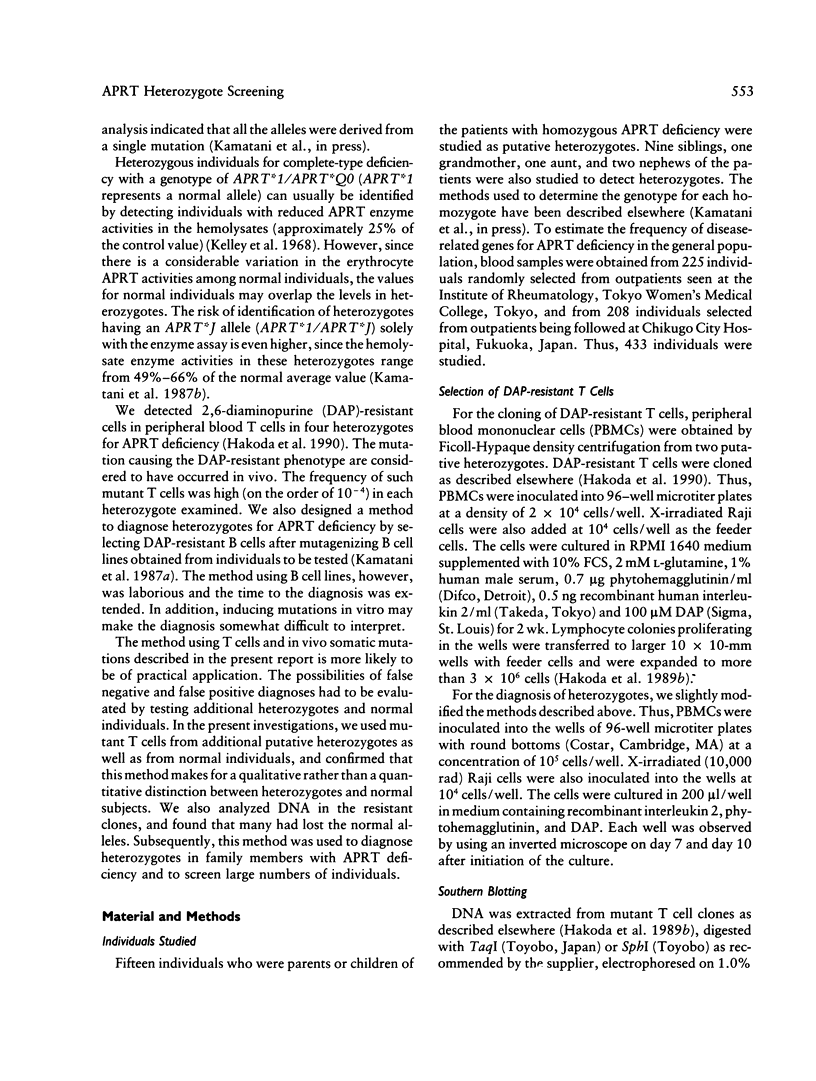
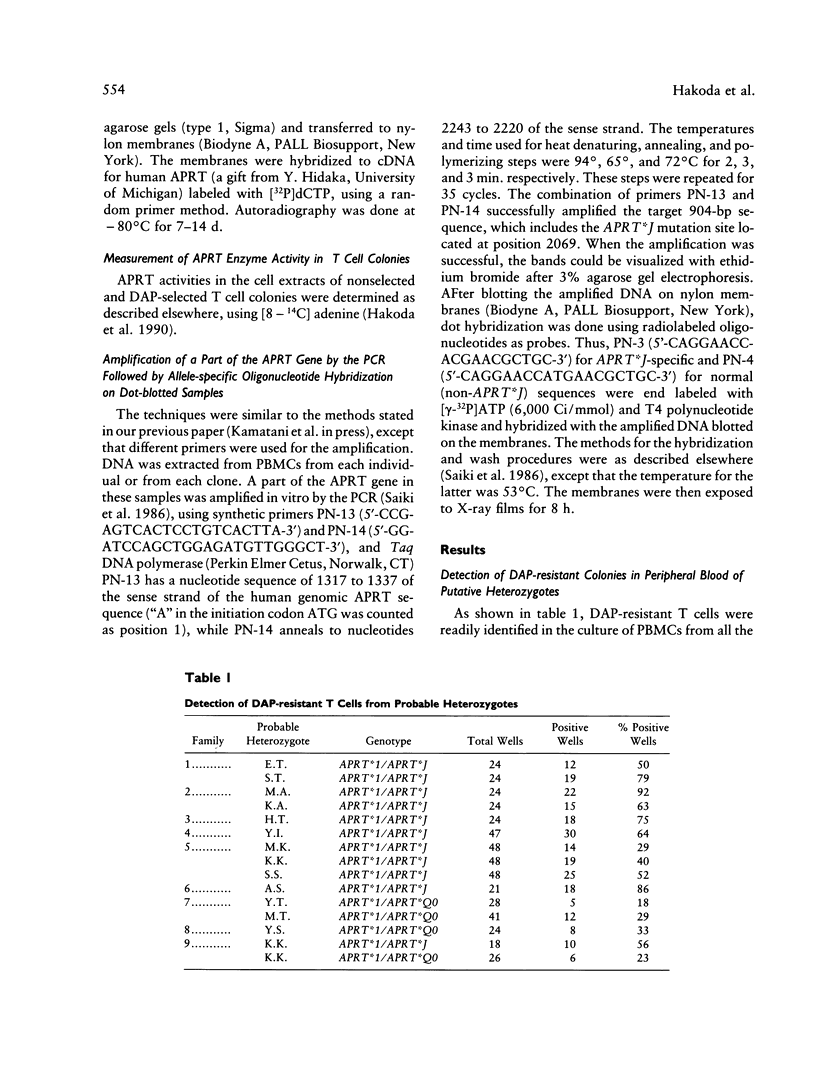
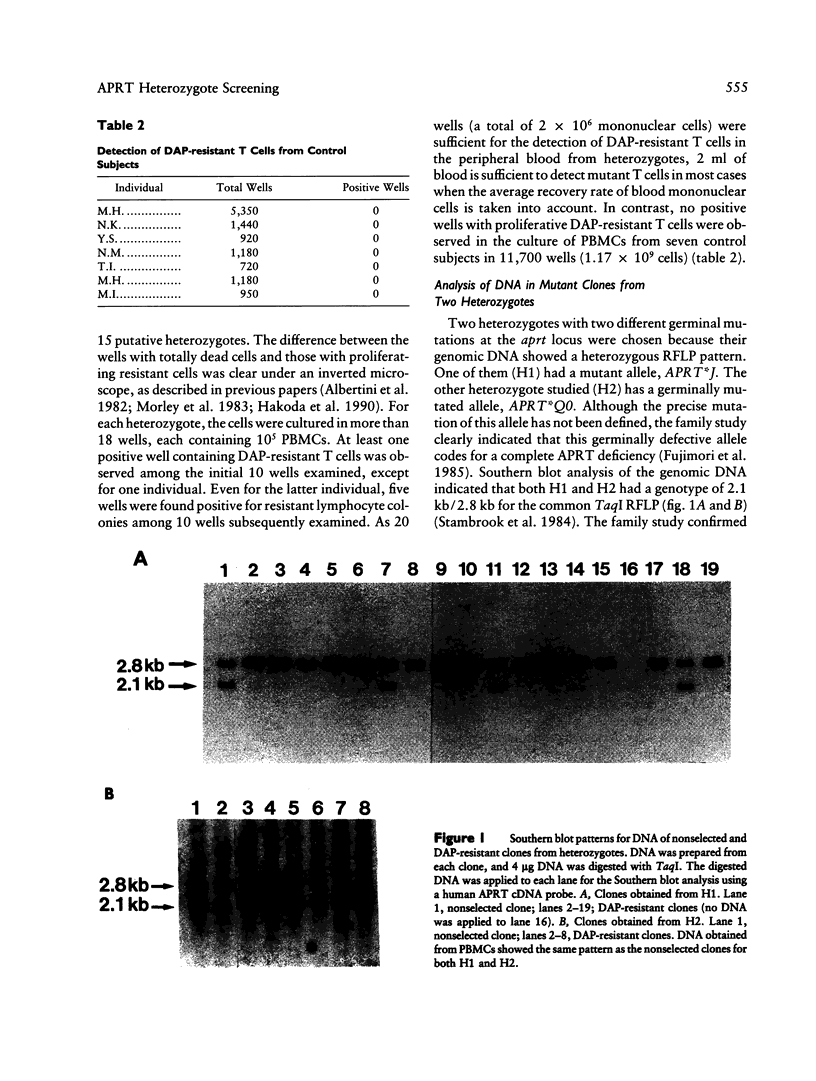
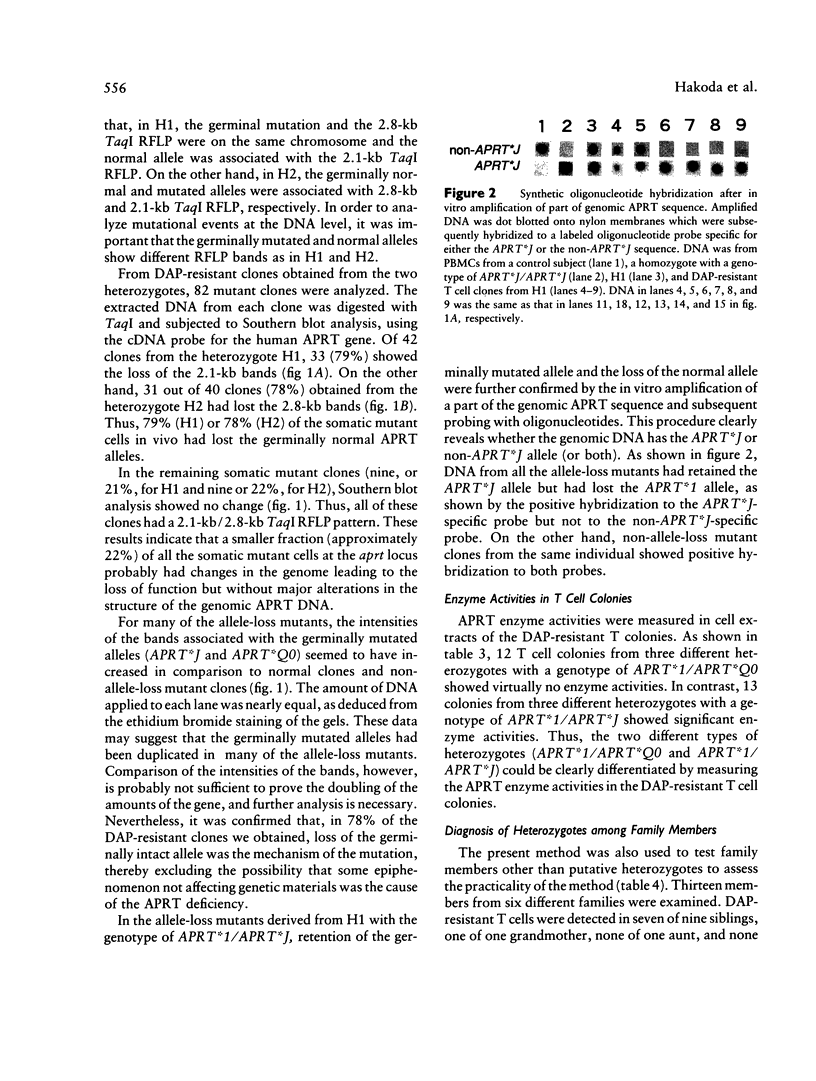
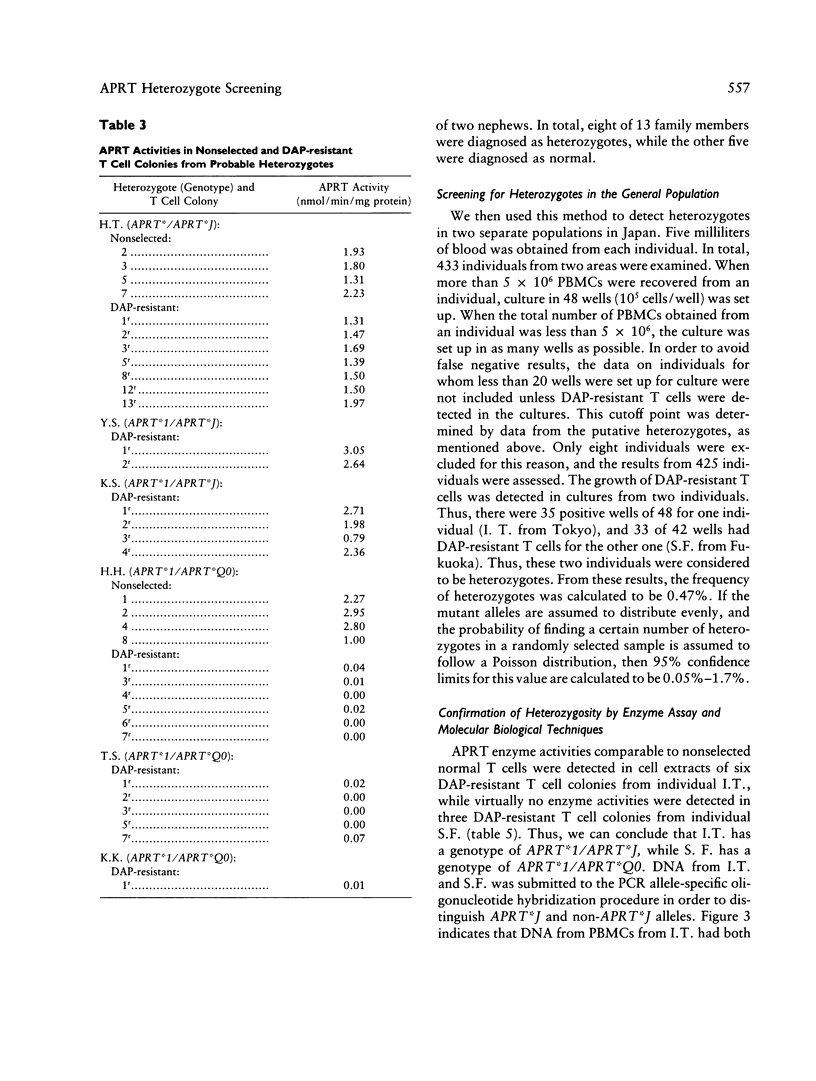
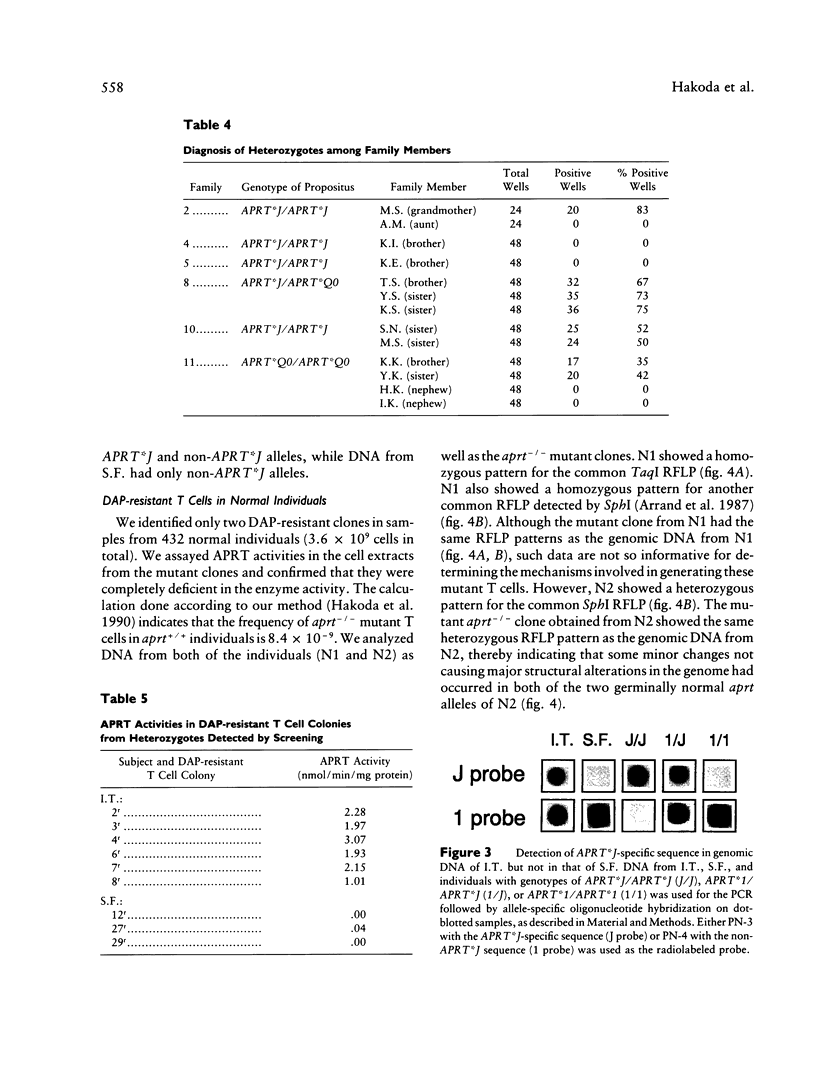
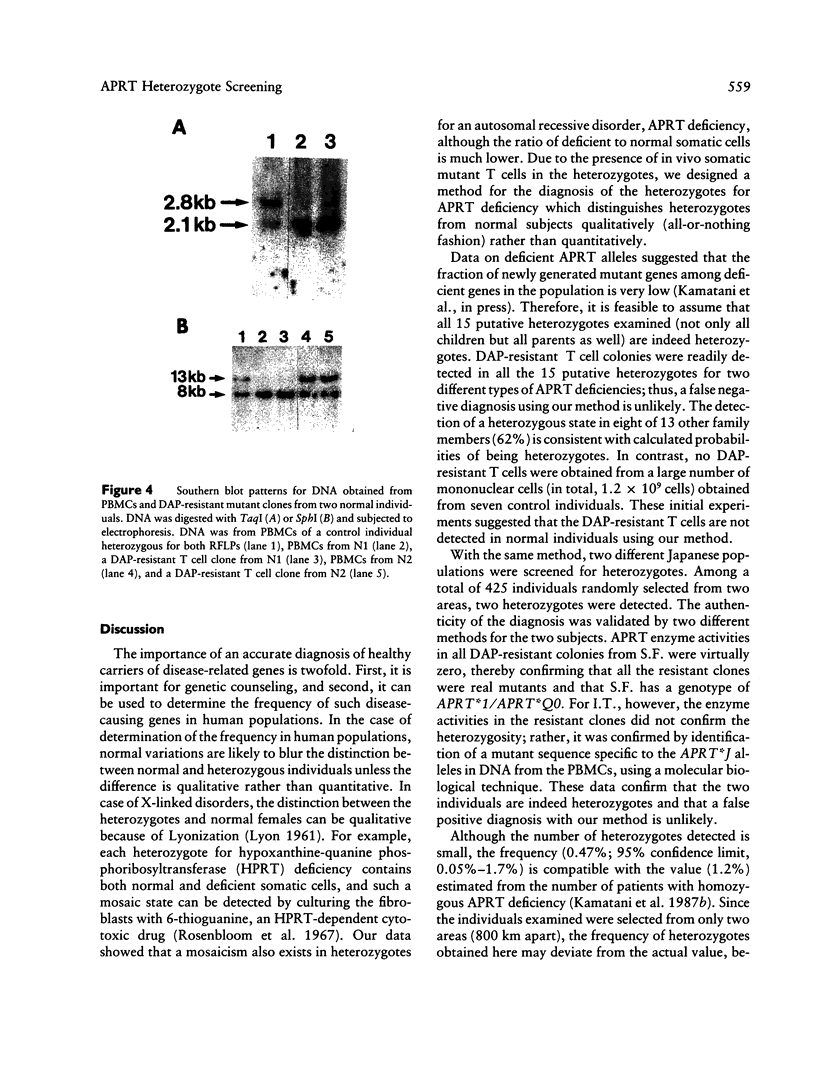
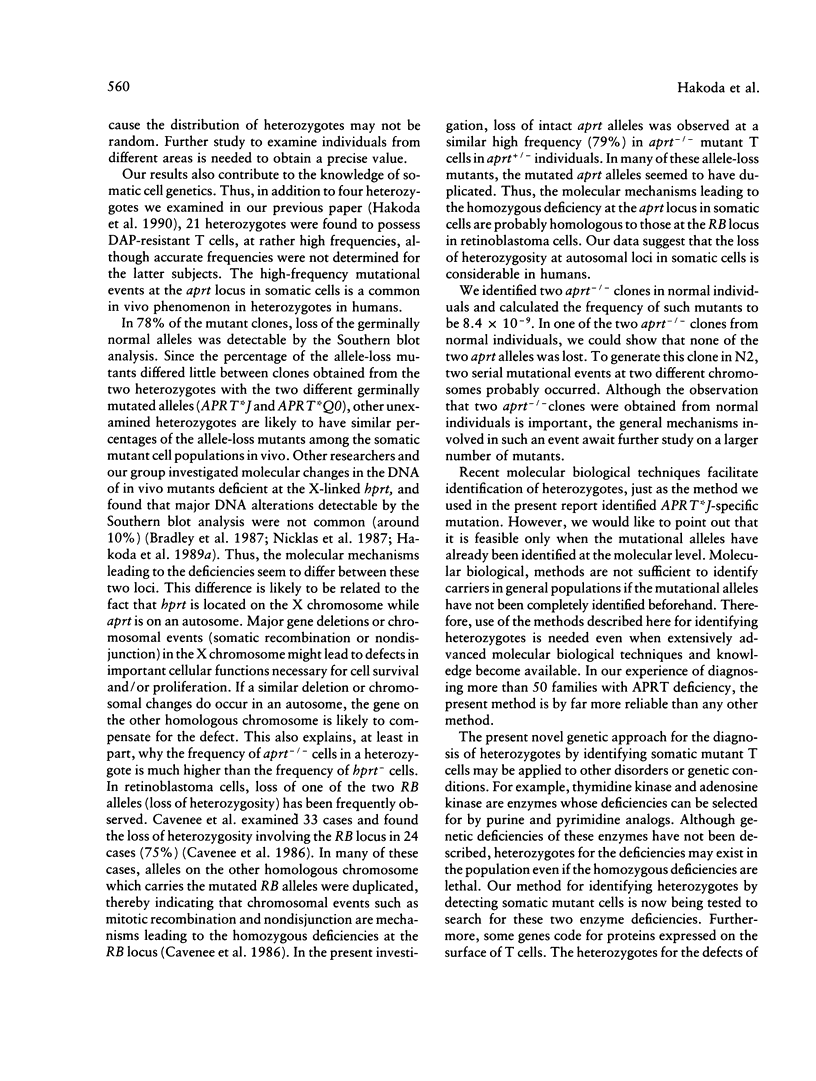
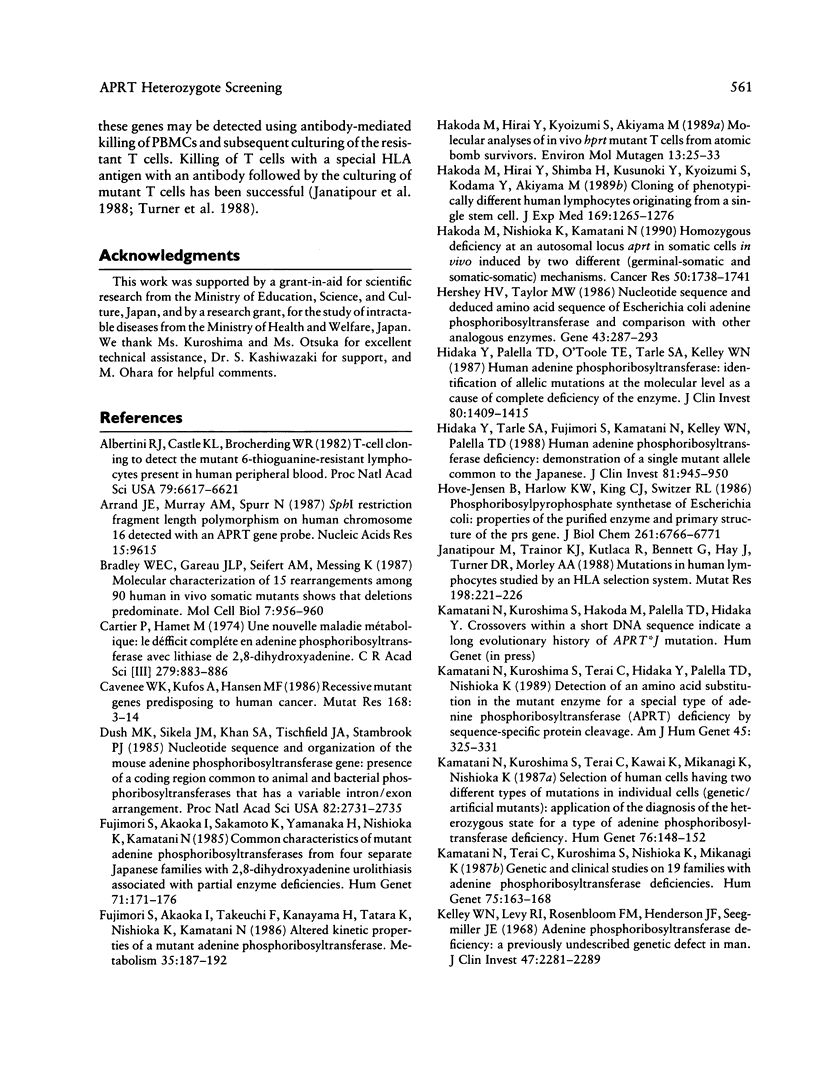
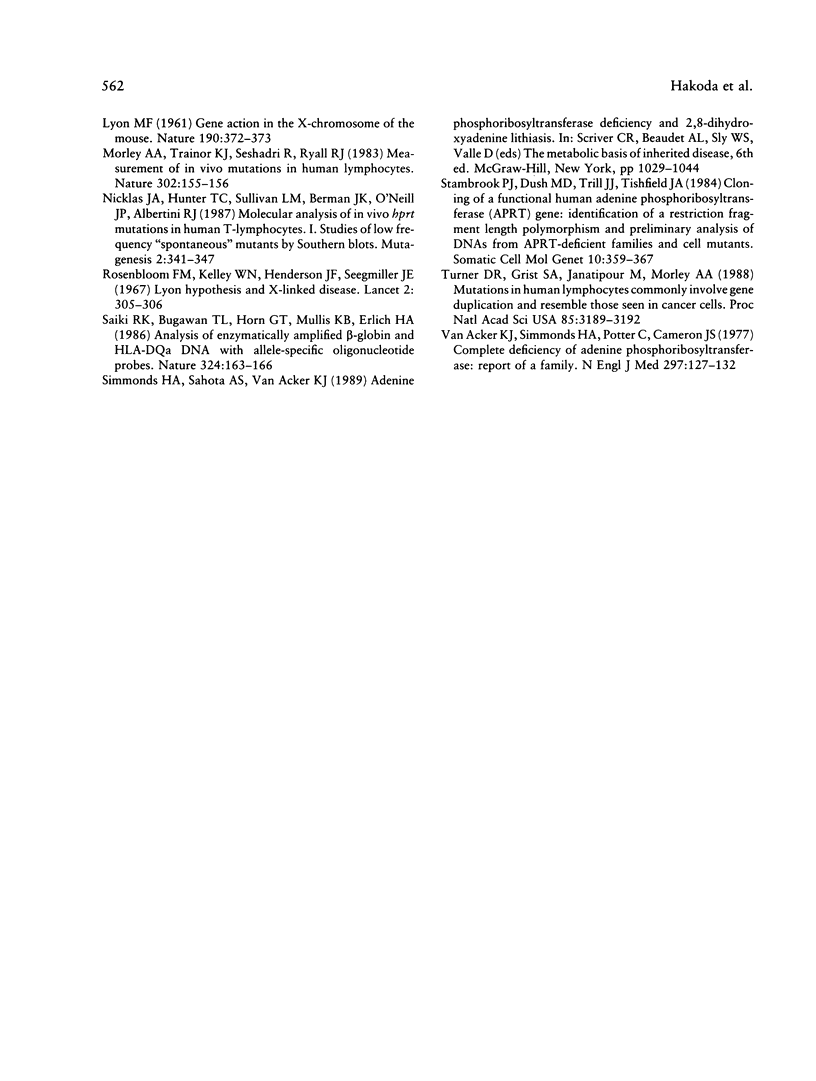
Images in this article
Selected References
These references are in PubMed. This may not be the complete list of references from this article.
- Albertini R. J., Castle K. L., Borcherding W. R. T-cell cloning to detect the mutant 6-thioguanine-resistant lymphocytes present in human peripheral blood. Proc Natl Acad Sci U S A. 1982 Nov;79(21):6617–6621. doi: 10.1073/pnas.79.21.6617. [DOI] [PMC free article] [PubMed] [Google Scholar]
- Arrand J. E., Murray A. M., Spurr N. Sph I restriction fragment length polymorphism on human chromosome 16 detected with an APRT gene probe. Nucleic Acids Res. 1987 Nov 25;15(22):9615–9615. doi: 10.1093/nar/15.22.9615. [DOI] [PMC free article] [PubMed] [Google Scholar]
- Bradley W. E., Gareau J. L., Seifert A. M., Messing K. Molecular characterization of 15 rearrangements among 90 human in vivo somatic mutants shows that deletions predominate. Mol Cell Biol. 1987 Feb;7(2):956–960. doi: 10.1128/mcb.7.2.956. [DOI] [PMC free article] [PubMed] [Google Scholar]
- Cartier P., Hamet M., Hamburger J. Une nouvelle maladie nétabolique: le déficit complete en adénine-phosphoribosyltransférase avec lithiase de 2,8-dihydroxyadénine. C R Acad Sci Hebd Seances Acad Sci D. 1974 Sep;279(10):883–886. [PubMed] [Google Scholar]
- Cavenee W. K., Koufos A., Hansen M. F. Recessive mutant genes predisposing to human cancer. Mutat Res. 1986 Jul;168(1):3–14. doi: 10.1016/0165-1110(86)90019-9. [DOI] [PubMed] [Google Scholar]
- Dush M. K., Sikela J. M., Khan S. A., Tischfield J. A., Stambrook P. J. Nucleotide sequence and organization of the mouse adenine phosphoribosyltransferase gene: presence of a coding region common to animal and bacterial phosphoribosyltransferases that has a variable intron/exon arrangement. Proc Natl Acad Sci U S A. 1985 May;82(9):2731–2735. doi: 10.1073/pnas.82.9.2731. [DOI] [PMC free article] [PubMed] [Google Scholar]
- Fujimori S., Akaoka I., Sakamoto K., Yamanaka H., Nishioka K., Kamatani N. Common characteristics of mutant adenine phosphoribosyltransferases from four separate Japanese families with 2,8-dihydroxyadenine urolithiasis associated with partial enzyme deficiencies. Hum Genet. 1985;71(2):171–176. doi: 10.1007/BF00283377. [DOI] [PubMed] [Google Scholar]
- Fujimori S., Akaoka I., Takeuchi F., Kanayama H., Tatara K., Nishioka K., Kamatani N. Altered kinetic properties of a mutant adenine phosphoribosyltransferase. Metabolism. 1986 Feb;35(2):187–192. doi: 10.1016/0026-0495(86)90122-8. [DOI] [PubMed] [Google Scholar]
- Hakoda M., Hirai Y., Kyoizumi S., Akiyama M. Molecular analyses of in vivo hprt mutant T cells from atomic bomb survivors. Environ Mol Mutagen. 1989;13(1):25–33. doi: 10.1002/em.2850130103. [DOI] [PubMed] [Google Scholar]
- Hakoda M., Hirai Y., Shimba H., Kusunoki Y., Kyoizumi S., Kodama Y., Akiyama M. Cloning of phenotypically different human lymphocytes originating from a single stem cell. J Exp Med. 1989 Apr 1;169(4):1265–1276. doi: 10.1084/jem.169.4.1265. [DOI] [PMC free article] [PubMed] [Google Scholar]
- Hakoda M., Nishioka K., Kamatani N. Homozygous deficiency at autosomal locus aprt in human somatic cells in vivo induced by two different mechanisms. Cancer Res. 1990 Mar 15;50(6):1738–1741. [PubMed] [Google Scholar]
- Hershey H. V., Taylor M. W. Nucleotide sequence and deduced amino acid sequence of Escherichia coli adenine phosphoribosyltransferase and comparison with other analogous enzymes. Gene. 1986;43(3):287–293. doi: 10.1016/0378-1119(86)90218-0. [DOI] [PubMed] [Google Scholar]
- Hidaka Y., Palella T. D., O'Toole T. E., Tarlé S. A., Kelley W. N. Human adenine phosphoribosyltransferase. Identification of allelic mutations at the nucleotide level as a cause of complete deficiency of the enzyme. J Clin Invest. 1987 Nov;80(5):1409–1415. doi: 10.1172/JCI113219. [DOI] [PMC free article] [PubMed] [Google Scholar]
- Hidaka Y., Tarlé S. A., Fujimori S., Kamatani N., Kelley W. N., Palella T. D. Human adenine phosphoribosyltransferase deficiency. Demonstration of a single mutant allele common to the Japanese. J Clin Invest. 1988 Mar;81(3):945–950. doi: 10.1172/JCI113408. [DOI] [PMC free article] [PubMed] [Google Scholar]
- Hove-Jensen B., Harlow K. W., King C. J., Switzer R. L. Phosphoribosylpyrophosphate synthetase of Escherichia coli. Properties of the purified enzyme and primary structure of the prs gene. J Biol Chem. 1986 May 25;261(15):6765–6771. [PubMed] [Google Scholar]
- Janatipour M., Trainor K. J., Kutlaca R., Bennett G., Hay J., Turner D. R., Morley A. A. Mutations in human lymphocytes studied by an HLA selection system. Mutat Res. 1988 Mar;198(1):221–226. doi: 10.1016/0027-5107(88)90058-9. [DOI] [PubMed] [Google Scholar]
- Kamatani N., Kuroshima S., Terai C., Hidaka Y., Palella T. D., Nishioka K. Detection of an amino acid substitution in the mutant enzyme for a special type of adenine phosphoribosyltransferase (APRT) deficiency by sequence-specific protein cleavage. Am J Hum Genet. 1989 Aug;45(2):325–331. [PMC free article] [PubMed] [Google Scholar]
- Kamatani N., Terai C., Kuroshima S., Nishioka K., Mikanagi K. Genetic and clinical studies on 19 families with adenine phosphoribosyltransferase deficiencies. Hum Genet. 1987 Feb;75(2):163–168. doi: 10.1007/BF00591080. [DOI] [PubMed] [Google Scholar]
- Kelley W. N., Levy R. I., Rosenbloom F. M., Henderson J. F., Seegmiller J. E. Adenine phosphoribosyltransferase deficiency: a previously undescribed genetic defect in man. J Clin Invest. 1968 Oct;47(10):2281–2289. doi: 10.1172/JCI105913. [DOI] [PMC free article] [PubMed] [Google Scholar]
- LYON M. F. Gene action in the X-chromosome of the mouse (Mus musculus L.). Nature. 1961 Apr 22;190:372–373. doi: 10.1038/190372a0. [DOI] [PubMed] [Google Scholar]
- Morley A. A., Trainor K. J., Seshadri R., Ryall R. G. Measurement of in vivo mutations in human lymphocytes. Nature. 1983 Mar 10;302(5904):155–156. doi: 10.1038/302155a0. [DOI] [PubMed] [Google Scholar]
- Nicklas J. A., Hunter T. C., Sullivan L. M., Berman J. K., O'Neill J. P., Albertini R. J. Molecular analyses of in vivo hprt mutations in human T-lymphocytes. I. Studies of low frequency 'spontaneous' mutants by Southern blots. Mutagenesis. 1987 Sep;2(5):341–347. doi: 10.1093/mutage/2.5.341. [DOI] [PubMed] [Google Scholar]
- Saiki R. K., Bugawan T. L., Horn G. T., Mullis K. B., Erlich H. A. Analysis of enzymatically amplified beta-globin and HLA-DQ alpha DNA with allele-specific oligonucleotide probes. Nature. 1986 Nov 13;324(6093):163–166. doi: 10.1038/324163a0. [DOI] [PubMed] [Google Scholar]
- Stambrook P. J., Dush M. K., Trill J. J., Tischfield J. A. Cloning of a functional human adenine phosphoribosyltransferase (APRT) gene: identification of a restriction fragment length polymorphism and preliminary analysis of DNAs from APRT-deficient families and cell mutants. Somat Cell Mol Genet. 1984 Jul;10(4):359–367. doi: 10.1007/BF01535631. [DOI] [PubMed] [Google Scholar]
- Turner D. R., Grist S. A., Janatipour M., Morley A. A. Mutations in human lymphocytes commonly involve gene duplication and resemble those seen in cancer cels. Proc Natl Acad Sci U S A. 1988 May;85(9):3189–3192. doi: 10.1073/pnas.85.9.3189. [DOI] [PMC free article] [PubMed] [Google Scholar]
- Van Acker K. J., Simmonds H. A., Potter C., Cameron J. S. Complete deficiency of adenine phosphoribosyltransferase. Report of a family. N Engl J Med. 1977 Jul 21;297(3):127–132. doi: 10.1056/NEJM197707212970302. [DOI] [PubMed] [Google Scholar]






